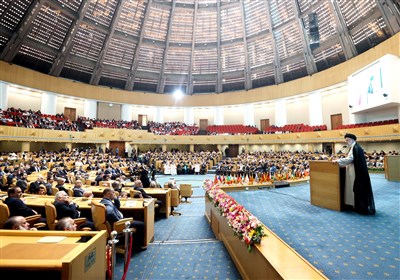Joe Biden Wins South Carolina Presidential Primary
TEHRAN (Tasnim) – Joe Biden emerged victorious Saturday from South Carolina’s frenzied Democratic primary, notching an overwhelming win that seems certain to reignite his campaign and could open a path to the party’s presidential nomination.
With 100% of precincts reporting Saturday night, the former vice president was winning every county in the state and had more than twice as many votes as Sen. Bernie Sanders of Vermont, who was running second.
Biden’s commanding victory — his first in his three presidential campaigns — reestablishes him as a top-tier candidate and gives him a Launchpad for the crucial Super Tuesday contests on March 3, when California and 13 other states will vote.
“For all those of you who’ve been knocked down, counted out, left behind, this is your campaign,” Biden told supporters in Columbia on Saturday night. “The press and the pundits had declared this candidacy dead. Now, thanks to all of you, the heart of the Democratic Party, we just won and we won big because of you. And we are very much alive.”
Even as votes were being counted, California billionaire Tom Steyer, who spent more time and money in South Carolina than any other candidate, announced he was dropping out of the race after finishing third and failing to win any delegates.
The still-crowded field of candidates is likely to narrow further in coming days. Other than Biden, only Sanders and former New York City Mayor Michael R. Bloomberg, who was not on the ballot here, are heading into Super Tuesday on firm footing.
After struggling for weeks, Biden had the most on the line in South Carolina. He needed to win convincingly — not just squeak out a victory — to lure back voters from other candidates running as pragmatists in contrast to Sanders’ progressive agenda.
“This is the moment to choose the path forward for our party,” Biden said. “The decisions Democrats make all across America in the next few days will determine what this party stands for, what we believe, and what we’ll get done.”
Candidates had thrown elbows, saturated the airwaves and spent with abandon here. They worked especially furiously to mine support from African American voters, the majority of those casting ballots here.
Biden’s long-touted “firewall” in South Carolina had appeared in danger of collapse after he suffered tough defeats in the first three contests — Iowa, New Hampshire and Nevada. But a turnaround appeared possible when the state’s moderates grew anxious that Sanders, a self-declared democratic socialist, might capture the nomination, and looked to Biden as a less risky choice.
Biden ultimately won in a blowout, with two-thirds of South Carolina’s black voters supporting him, as well as two-thirds of all voters over the age of 65, according to exit polls by Edison Research for the major TV networks.
He won several other demographics, including whites and voters with — and without — college degrees. The margin far exceeded what recent polls had projected.
Biden’s campaign clearly got a shot of adrenaline after he was endorsed by the state’s most influential Democrat, Rep. James E. Clyburn, the third-ranking Democrat in the House. Exit polls suggested the Clyburn nod had a big impact on voters. Voters were also reassured by Biden’s performance in a fractious candidates’ debate on Wednesday.
Pete Buttigieg, the former mayor of South Bend, Ind., Sen. Amy Klobuchar of Minnesota, Sen. Elizabeth Warren of Massachusetts and other candidates failed to make inroads with African Americans, who make up roughly 60% of Democratic voters here, giving Biden a clear edge.
Those voters sent a clear message that they would not be swayed by the verdict of overwhelmingly white Iowa and New Hampshire, or even of more diverse Nevada — states that boosted Sanders and undercut Biden’s claim that he was the most electable.
But South Carolina’s primary is the first true test of the candidates’ strength among black voters — which Biden argues is key to retaking the White House.
“With the Biden movement, it may have started off slow like it’s going nowhere, but it’s getting higher ... and higher,” said Brooks Harrison, 68, a preacher and the owner of East Side Soul Food in Charleston, who said he voted for Biden first thing in the morning, The Los Angeles Times reported.
With South Carolina, he said, “Now we’re getting down to the nitty-gritty.”
The fluidity of the race here reflected the deep state of anxiety in the Democratic nomination battle nationwide. Exit polls showed that many voters were undecided until the moment they went to the polls.
Biden hopes momentum from his huge win here will help him edge out other moderates on Super Tuesday, when other large, diverse and delegate-rich states — including Virginia, North Carolina, Massachusetts and Texas — are up for grabs.
That would, in theory, leave him and Bloomberg fighting for the moderate votes against Sanders. After Biden’s victory Saturday, Terry McAuliffe, the popular former governor of Virginia, endorsed him.
Bloomberg, who did not enter the race until late November, will first appear on ballots Tuesday. His unprecedented spending — he has poured more than half a billion dollars into his bid already — presents a formidable threat. But Bloomberg’s first debate was widely seen as a disaster, and his second as only adequate, lowering his chances.
“Mike Bloomberg has not been on the ballot yet,” Kevin Sheekey, the billionaire’s campaign manager, said Saturday night. “Mike is the only candidate to campaign in all 14 Super Tuesday states over the last two months and we look forward to Tuesday.”
The battle between Biden and Bloomberg could widen the opening for Sanders, whose dominance among progressives positions him for an intimidating delegate haul Tuesday. With his huge war chest and sturdy infrastructure in key states, Sanders appears better positioned than anyone else.
Yet South Carolina proved sobering for Sanders. Polls last week showed him closing on Biden, not getting trounced. In the end, just 13% of black voters supported Sanders, according to exit polls.
Sanders, who had campaigned heavily in the state, sought to shrug off the disappointing loss.
“There are lots of states in the country. Nobody wins them all,” he told supporters in Virginia Beach, Va. “I believe very strongly that the people of this country on Super Tuesday and after are going to support our campaign because we are more than a campaign — we are a movement.”
The senator from Vermont is dominating in California — the crown jewel of Super Tuesday — where a UC Berkeley Institute of Governmental Studies poll conducted for The Times found him ahead of his nearest rival by 2 to 1, leaving him poised to vacuum up the lion’s share of the state’s delegates.
Sanders is also worrying rivals in other big states. He drew what his campaign estimated was more than 13,000 people to the Boston Common on Saturday afternoon. Polls show him running neck-and-neck with Warren in Massachusetts, her home state. Polls showed Sanders also overtaking Biden in delegate-rich Texas.
“I’ll be the first to say that the first four contests haven’t gone exactly as I’d hoped,” Warren, who has yet to win, said Saturday on a campaign swing in Texas. But she vowed to push on.
The prospect that Democrats will arrive at their nominating convention in Milwaukee this summer with Sanders holding the largest number of delegates — but not the majority needed to clench the nomination — continues to grow.
That scenario would invite a contentious floor fight in which Democratic centrists could try to consolidate behind a consensus choice, and hundreds of party leaders who are designated “super delegates” could ultimately decide the outcome.
The possibility of such a messy situation has stepped up pressure on Buttigieg and Klobuchar to exit the race. Klobuchar’s hopes were so dim in South Carolina that she barely campaigned here, focusing on Super Tuesday states.
And Buttigieg’s confident predictions of African American support did not materialize. They both did dismally with black voters. Exit poll results showed just 3% supported Buttigieg, while Klobuchar found no support among African Americans here.
Both candidates face stiff headwinds on Super Tuesday. But the muddled field could encourage them to stay in the race, since any delegates they gather could position them to play an influential role in a brokered convention — or even emerge as a compromise choice.
Steyer dropped out after focusing all of his efforts in Nevada and South Carolina, where he spent $186 million on ads.
“I said if I didn’t see a path to winning that I’d suspend my campaign,” he said Saturday night. “And honestly, I can’t see a path where I can win the presidency.”






